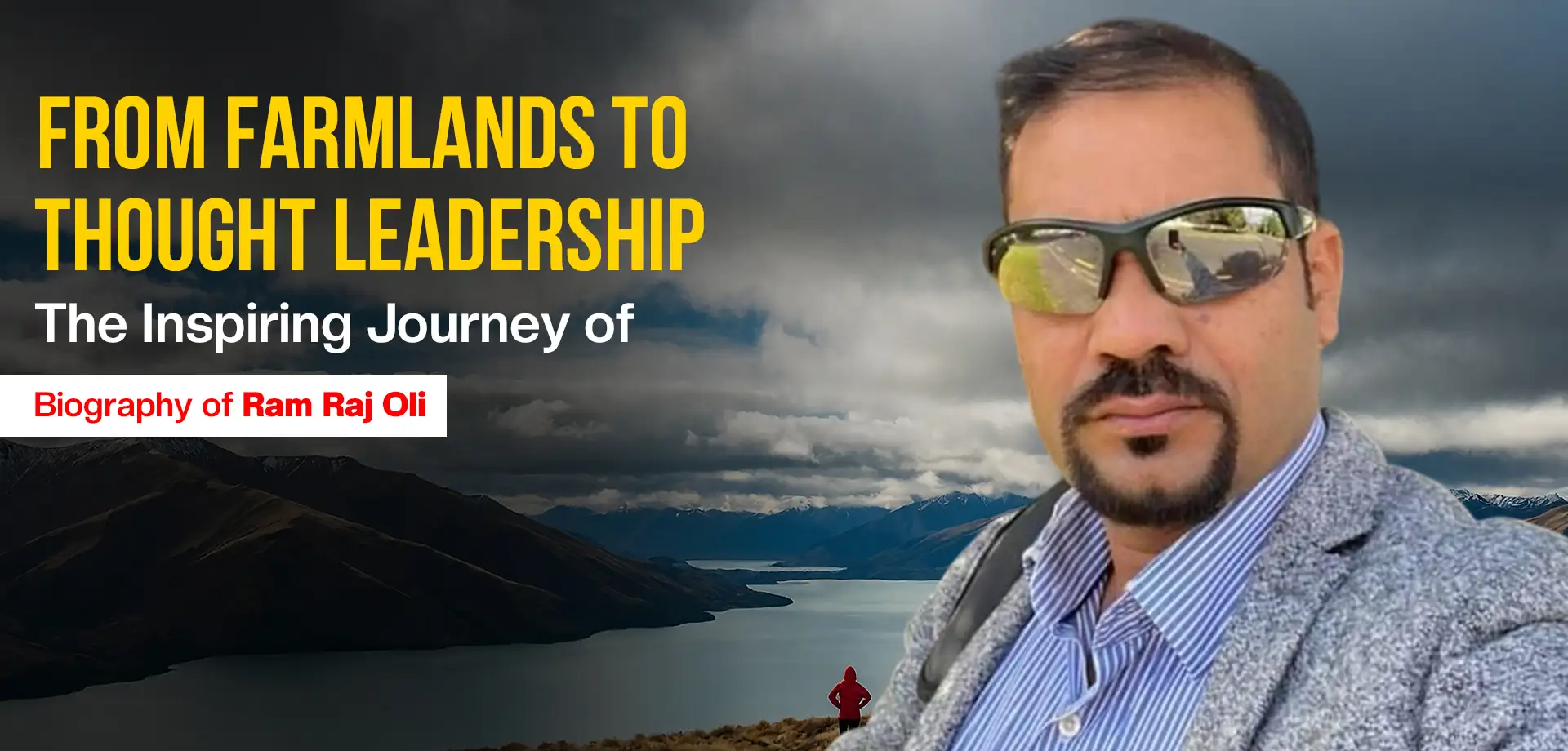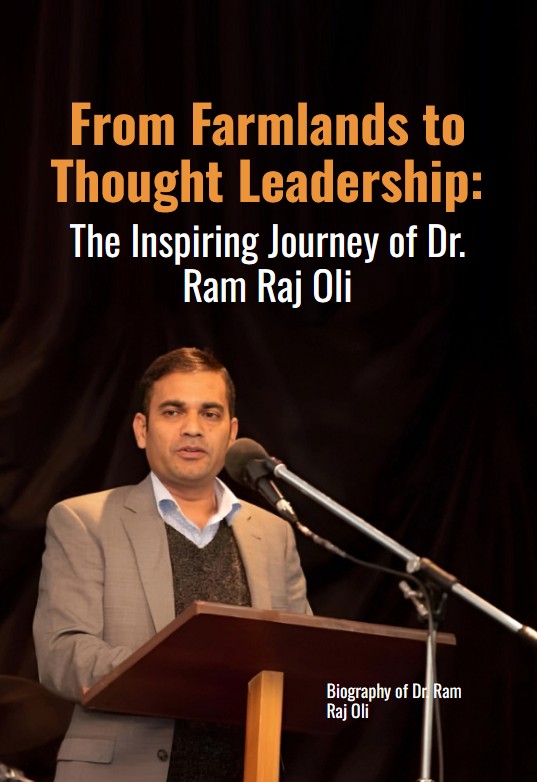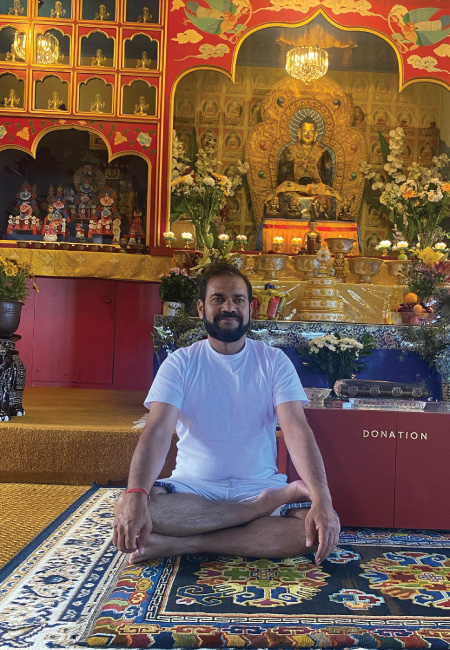

“Before he shaped policies, he shaped his own path — through silence, service, and self-mastery.”
Introduction
To know Dr. Ram Raj Oli is to witness a life lived with intention. His journey is not defined by chance or convenience, but by an unwavering commitment to purpose — a purpose rooted in education, elevated by global vision, and sustained by humility and service. His life is not a straight line of achievements but an upward spiral — each level built on discipline, resilience, and an almost sacred sense of responsibility.
Born in a rural village in Nepal, surrounded by farmlands, mountains, and the quiet pulse of community life, young Ram Raj learned early that greatness is not a destination — it’s a way of thinking. The foundation of his journey was laid not in lecture halls but in the fields, where he witnessed firsthand the value of hard work, the resilience of his parents, and the power of routine. There were no shortcuts, no silver linings — only the consistent choice to rise, study, contribute, and lead.
“His story begins where many stories end — in the humble stillness of the unseen.”
What separates Dr. Oli from many others in academia or public service is not just what he knows, but how he applies what he knows — and for whom.
At every stage of his life, he has used knowledge as a tool for empowerment, not personal gain. Whether as a teacher guiding university students, a policy advisor crafting frameworks for national development, or a speaker igniting self-belief in others, his compass has remained steady: elevate others. Always.
He holds multiple advanced degrees, including a Doctorate in Education and international qualifications from countries like South Korea, Finland, New Zealand, and the United Kingdom. He speaks the language of academic excellence fluently but chooses to translate it into impact — especially for marginalized populations, rural communities, and emerging leaders.
His expertise spans across development studies, education reform, governance policy, intercultural learning, and motivational coaching. But his identity extends even further — he is a mentor, a life coach, a researcher, a servant leader, and a quiet reformer who continues to challenge systems without shouting.
Despite his many accolades, Dr. Oli remains grounded in humility. He often credits his spiritual practice, self-discipline, and time in nature as key reasons for his clarity and strength. He does not seek power for its own sake; he seeks positions only as platforms from which to create meaningful, people-centered change.
Phase 1 : Roots in the Soil
Before his name reached global conferences and academic halls, his hands touched the soil. And that soil taught him everything.”

The story of Dr. Ram Raj Oli does not begin in the cities of policy influence or on university podiums. It begins in the quiet fields and rural hills of Nepal, where time moved slowly, but lessons ran deep. Born into a farming family, surrounded by mountains and the rhythm of the seasons, his earliest education came not from books — but from watching his parents rise before dawn, work without complaint, and serve without recognition.
His father, a humble farmer, worked tirelessly from morning to night. His hands were rough from the plough, his posture curved by decades of labor, but his words were always measured and his principles firm. He spoke little, but when he did, his words carried weight — about fairness, about work, about responsibility. Ram Raj learned early that “if you want to change your life, change how you carry your mornings.”
His mother was equally instrumental — nurturing, wise, and deeply spiritual. She held the home together with an invisible kind of strength. From her, he learned how to care. How to stay soft even when the world is hard. How to endure without losing empathy. She didn’t just raise children — she shaped character.
Their home was modest, built with simple materials but filled with an atmosphere of order, humility, and purpose. There were no luxuries, but there was always love — expressed through food, prayer, and a shared commitment to keep moving forward.
As a boy, Ram Raj was deeply observant. He didn’t speak unless he had something meaningful to say. He noticed the way plants grew, the way animals reacted to change, the way villagers interacted with reverence toward elders and rituals. This sensitivity to people and environments would later become a core strength in his intercultural and global work.
He attended a local school, where infrastructure was limited, but the hunger for learning was vast. He often walked several kilometers just to attend class. The blackboards were dusty, and books were shared among students, yet every lesson mattered. He cherished education as something sacred — because he knew that in his world, a degree wasn’t just a certificate — it was a doorway.
There were challenges. Economic hardship often cast a shadow over his academic dreams. There were days he went to school hungry or worked in the fields immediately after class. But he never used struggle as an excuse. Instead, he let it become his structure — a training ground for focus, patience, and inner strength.
Phase 2 : A Student of Life
"True education does not just fill the mind. It stretches the soul.”

As Dr. Ram Raj Oli transitioned from village life into the wider academic world, his hunger for learning only deepened. To those who observed him, he appeared calm — even reserved. But beneath that quiet demeanor was a restless, relentless spirit. A student not just of subjects, but of systems, people, patterns, and the very meaning of growth.
After completing his schooling, Ram Raj made the courageous leap into higher education, a journey few from his village had taken. His enrollment at university marked a significant turning point — both for himself and for his family. This was uncharted territory. But it was here, in university classrooms, that his curiosity found fuel and his discipline found direction.
He approached every lecture as a privilege. He sat in the front rows, not to impress, but to absorb. While many students focused on passing exams, Ram Raj focused on understanding concepts deeply, often questioning the underlying logic behind systems and policies. He had a gift for connecting theory with reality, always asking how what he was learning could solve real problems — especially in rural and marginalized communities like the one he came from.
His academic journey was not linear or without struggle. There were times when finances were tight, books were hard to come by, and doubt crept in. Yet, he never allowed limitations to become excuses. He borrowed books, photocopied chapters, and stayed up late discussing ideas with friends. Knowledge, to him, was sacred — and every ounce of it worth the effort.
As he progressed, professors began to take note of his sharp analytical mind and deep moral compass. He was not the loudest debater in the room, but when he spoke, people listened. His questions were incisive, often challenging outdated models or encouraging the application of theoretical frameworks to rural education, governance, and social equity.
It became clear that Ram Raj wasn’t just learning for himself. He was preparing to teach, to influence, to lead. He became involved in research projects, volunteered for academic forums, and frequently served as a mentor to junior students. Even at this early stage, he began building a reputation not just as a bright student — but as a thoughtful, people-focused scholar with unusual depth.
Phase 3 : From Classrooms to Nations
“When he stood before a classroom, he wasn’t just teaching students — he was training future nation-builders.”

With the completion of his formal education in Nepal, Dr. Ram Raj Oli did not pause to celebrate. He stepped directly into his calling as an educator, ready to serve and influence others. For him, teaching was never just a profession — it was a sacred duty. A way to shape minds, transform thinking, and quietly prepare a better future.
His early days as a university lecturer were filled with both challenge and excitement. Many of his students came from backgrounds similar to his own — humble, eager, and uncertain. He understood their struggles intimately and committed himself to more than just delivering lectures. He became a guide, a mentor, a mirror, and a motivator.
He did not stand at the front of the class to talk down to anyone. He engaged with his students as peers in learning, often reminding them that “Education is not about superiority. It is about service.”
His lectures were known not only for their academic rigor but for the stories, analogies, and global perspectives he brought into them. He would reference scholars from around the world and contextualize their insights within the Nepali experience. He encouraged students to ask difficult questions, to challenge norms, and to think like problem-solvers, not passive recipients.
During this time, his interest in educational policy also began to grow. He observed how even the most well-intentioned teachers struggled against flawed systems — outdated curricula, underfunded institutions, and bureaucratic inefficiencies. He began writing articles, attending seminars, and connecting with others who shared a vision of transformational education reform.
It wasn’t long before Dr. Oli’s voice extended beyond the classroom. His insights caught the attention of government bodies, NGOs, and international development organizations. He began working on collaborative projects that merged academic theory with practical application, particularly in areas of curriculum development, teacher training, and educational equity.
Driven by this conviction, he expanded his work to include policy research and national-level education programming. He collaborated on projects aimed at improving access to education in rural areas, incorporating local knowledge into school materials, and designing teacher development frameworks that valued both content and context.